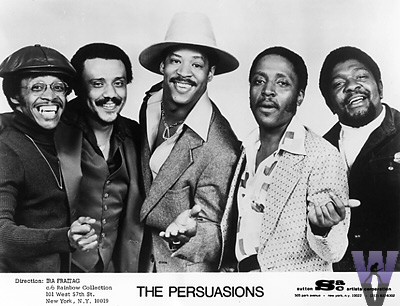 Persuasions in the their prime, in the ’70s: Jayotis Washington, Jimmy Hayes, Jerry Lawson, Toubo Rhoad, “Sweet Joe” Russell Persuasions in the their prime, in the ’70s: Jayotis Washington, Jimmy Hayes, Jerry Lawson, Toubo Rhoad, “Sweet Joe” Russell |
More info available at www.thepersuasions.org
The Persuasions are the undisputed heavyweight champions of a cappella. They are, as the L.A. Weekly once wrote, “to singing what Muhammad Ali was to boxing—invincible, innovative, original, beautiful.” The original five Persuasions—Jerry Lawson, Jimmy Hayes, Joe Russell, Jayotis Washington, and Herbert “Toubo” Rhoad—fell together by chance in 1962, harmonizing on outdoor basketball courts in Brooklyn after pick-up games. They went on to release 22 albums and to perform or record with many artists including Liza Minelli, Bette Midler, Stevie Wonder, Lou Reed, Van Morrison, Paul Simon, Joni Mitchell, Gladys Knight, Patti LaBelle, Little Richard, Nancy Wilson, The Neville Brothers, Country Joe McDonald, B.B. King, John Hiatt, Leon Redbone. Their music has turned up in films from Joe and the Volcano to The Heartbreak Kid, Streets of Gold, and E.T. Throughout the 60s, 70s, and most of the 80s, The Persuasions preached the a cappella gospel almost entirely alone—certainly the secular, eclectic a cappella gospel. When the genre suddenly acquired mainstream popularity, partly as an outgrowth of rap and hip-hop, groups such as Take Six and Boyz II Men pointed to The Persuasions as nothing less than their main inspiration. The Persuasions are hailed by a cappella ensembles everywhere as a seminal, inimitable influence. From Rockapella to the Nylons, contemporary vocal bands speak of Persuasions albums with reverence and awe. Critics often place Lawson’s inspired phrasing and warm baritone (which began as a tenor) in a context with Sam Cooke, Brook Benton & Otis Redding. The Persuasions’ first record deal was with Frank Zappa in 1968. He “discovered” them over the phone when their friend (and eventual producer) David Dashev, phoned Zappa from a New York studio, declaring, “you’ve got to hear this.” They debuted to the world with the LP, A Cappella on Zappa’s Straight label. Said Zappa many years later ” I could tell, even over the phone, that these guys were something special.” Rock critic and author Greil Marcus once called The Persuasions’ style a “perfect marriage of passion and intelligence,” and Rolling Stone rated their 1977 album, Chirpin’, as one of the hundred best works of the 1970s. These were singers in the tradition of great gospel a cappella groups such as The Golden Gate Quartet and The Fairfield Four, but the Persuasions advanced the art form into a percolating, pulsing, street-edged meld of rock ‘n’ roll, soul, country, blues. . .In short, they “Persuasionized” any songs that suited them, and made them their own—from “Papa Oom Mow Mow” (heard in “E.T.”) to “Curtis Mayfield’s “Man Oh Man” to Kurt Weill’s “Oh Heavenly Salvation.” Lawson adapted a huge range of popular music to a cappella style, with his own clever arrangements, and produced Persuasions shows and recordings. He was an electrifying front man who also had the gift of gab. Some of his between-song patter was simply great stand-up comedy. Though discovered by college radio in the early ’70s, championed by Barry “Dr. Demento” Hansen (who had them record his theme song), they got little more than token FM airplay on the west coast in the ’70’s, while in NY they were being played constantly by Frankie Crocker on WBLS. Their albums were often wrongly relegated to “doo wop” and “oldies” bins in record stores. Still, they carried on, building a deeply devoted audience and touring the world. Their live performances remain the stuff of legend (thankfully borne out by various audience recordings and Wolfgang’s Vault shows.) Incredibly, Bruce Springsteen opened for The Persuasions on more than one occasion. In 1979 The Persuasions became an integral part of Joni Mitchell’s legendary “Shadows and Light” tour. Following their Straight album, The Persuasions signed with Capitol and recorded three of the most arresting vocal albums ever made: We Came to Play, Spread the Word, and Street Corner Symphony. They covered tunes by Bob Dylan, Sam Cooke, Kurt Weill, Curtis Mayfield, The Temptations, Joe South, Rogers and Hammerstein, Lennon and McCartney. This eclectic mix of material and genre was a direct result of Lawson’s taste in music, and it became a template for the many Persuasions albums that were to follow, culminating in the 1990’s with a gospel album, a children’s album, and acclaimed tribute albums to Frank Zappa, The Beatles, and The Grateful Dead. Perhaps, to really understand the impact of this American musical institution, it is best to quote Tom Waits, who famously remarked: “These guys are deep sea divers. I’m just a fisherman in a boat.” Rock critic and author Greil Marcus once called The Persuasions’ style a “perfect marriage of passion and intelligence,” and Mix Magazine proclaimed “The Persuasions are four parts of one voice, one spirit.” Cash Box correctly noted, in 1996, “These all-vocal, instrument-free heroes paved the way for today’s platinum A Cappella acts, Take 6 and Bobby McFerrin, as well as the retro-hip-hop styles of Boyz II Men, and the recent winners from NBC’s The Sing Off, The Pentatonix.”
To Be Continued
